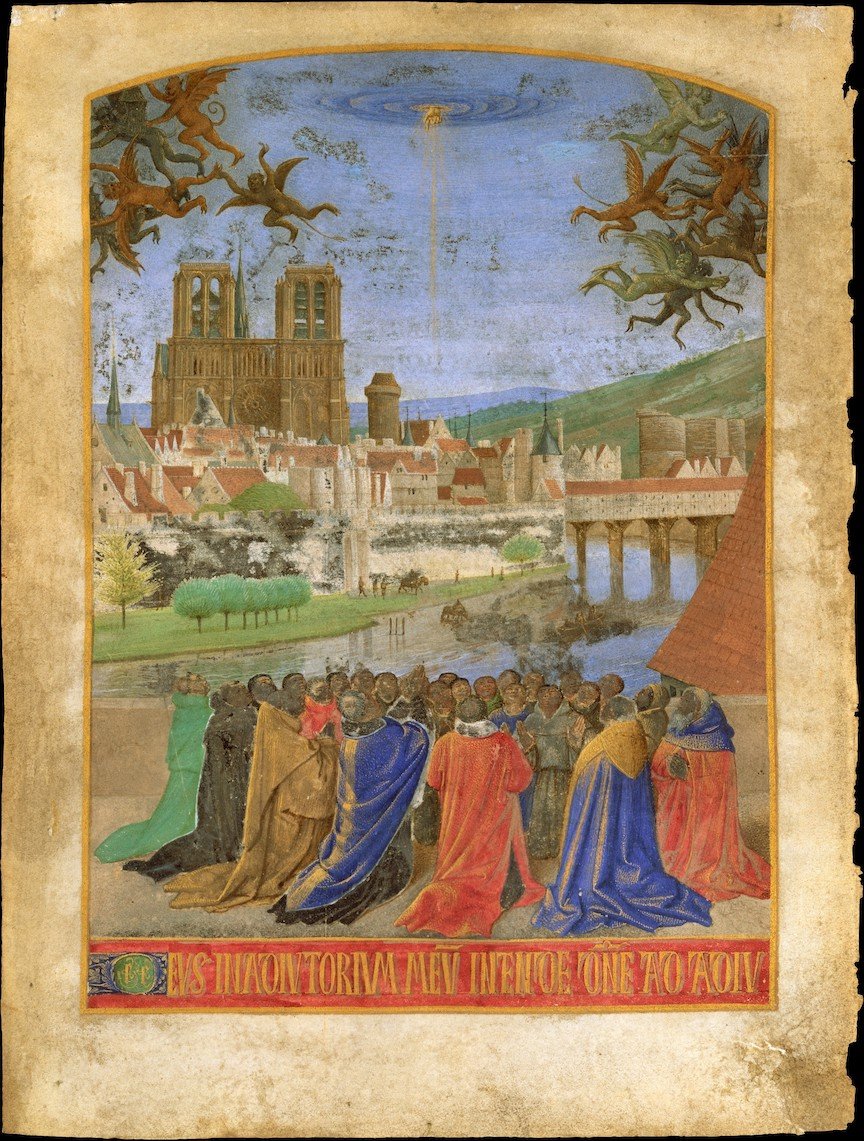The first Psalm in the Psalter essentially defines two perspectives: that of the “Blessed,” the self whose heart is centered in the Lord, who as we saw in #139 is “closer to us than we are to ourselves,” (a quote either from Augustine or Aquinas, I think.) That Psalm, as I hope I made clear in P&D #2, is my understanding of the intimacy and omnipresence of God in my life and in the world, though most of the time what I experience is the profound hiddenness of God. The second perspective of the first Psalm of course is that of the self centered in something other than God: those the Psalmist identifies as “the wicked, the sinners, the scorners,” each with a different verb and identifying phrase. There are thus for the Psalmist: Two ways; 2 directions; 2 very different images.
The experience of the self whose heart is grounded in the Lord, the first way, “the law of the LORD,” is “delight”; he is the person “who ponders his law day and night.” Since “the law” here is an expression of God’s being and “day and night” mean essentially always, the way of the self here means, for me, always centered in God. “Love the Lord your God with all your heart…”
The image the Psalmist uses of the tree planted by the ”flowing waters” whose roots are thus always at the source of life (in God) indicates the fecundity of the life so centered, the substance: fruit in season, never fading green leaves, airways prospering.
The image for the wicked, for those whose hearts are essentially elsewhere, is a startling contrast to the image for the blessed: they are “like winnowed chaff,” useless husks to be simply blown away by the wind.
For me the language in verse 6 echoes that of #139: “for the LORD knows the way of the just” (italics mine). The intimacy of #139 is suggested here but used in, one might say, a less intimate way since the Psalmist is defining the two very different ways.
Psalm 1
1 Blessed indeed is the man who follows not the counsel of the wicked, nor stands in the path with sinners, nor abides in the company of scorners,
2 but whose delight is the law of the LORD, and who ponders his law day and night.
3 He is like a tree that is planted beside the flowing waters, that yields its fruit in due season, and whose leaves shall never fade; and all that he does shall prosper.
4 Not so are the wicked, not so! For they, like winnowed chaff, shall be driven away by the wind.
5 When the wicked are judged they shall not rise, nor shall sinners in the council of the just;
6 for the LORD knows the way of the just, but the way of the wicked will perish.
I was delighted to discover that Thursday’s OT reading from Jeremiah for Lent (3/16/22) was obviously chosen to go along with the first Psalm in the Psalter. Here again the imagery is pronounced and explicit, and also from nature: “a barren bush in the desert,” sterile and eternally unchanging like, for example, the unrepentant sinners in Dante’s Inferno, “a lava waste,” “a salt and empty earth.” Those are rather terrifying images, again calling to my mind the hot sterile sands of the runners always chasing the body (flesh) in Dante’s Inferno.
Jeremiah’s image for the (same word) “blessed” man whose heart again is essentially grounded in the LORD, who is the man’s trust, his hope, is like the person whose roots are extended to the flowing stream with similar consequences.
The turn that Jeremiah’s verse takes at this point in his text is rather wonderful and precise: “More tortuous than all else is the human heart, beyond remedy; who can understand it?” The situation looks hopeless given the tortuous nature of the human heart, “full of twists and turns.” But as in #139 there is the LORD: “I, the LORD, alone probe the mind and test the heart, To reward everyone according to his ways [see Psalm #1], according to the merits of his deeds.” Jeremiah like the Psalmist in #1 also clearly understands that there are two ways and that even though the human heart is tortuous what it can choose to be centered in is clear. LES
A reading from
the Book of the Prophet Jeremiah17:5-10
Thus says the Lord:/ Cursed is the man who trusts in human beings,/ who seeks his strength in flesh,/ whose heart turns away from the Lord./ He is like a barren bush in the desert/ that enjoys no change of season,/ But stands in a lava waste,/ a salt and empty earth./ Blessed is the man who trusts in the Lord,/ whose hope is the Lord./ He is like a tree planted beside the waters/ that stretches out its roots to the stream:/ It fears not the heat when it comes,/ its leaves stay green;/ In the year of drought it shows no distress,/ but still bears fruit./ More tortuous than all else is the human heart,/ beyond remedy; who can understand it?/ I, the Lord, alone probe the mind/ and test the heart,/ To reward everyone according to his ways,/ according to the merit of his deeds.
The word of the Lord

